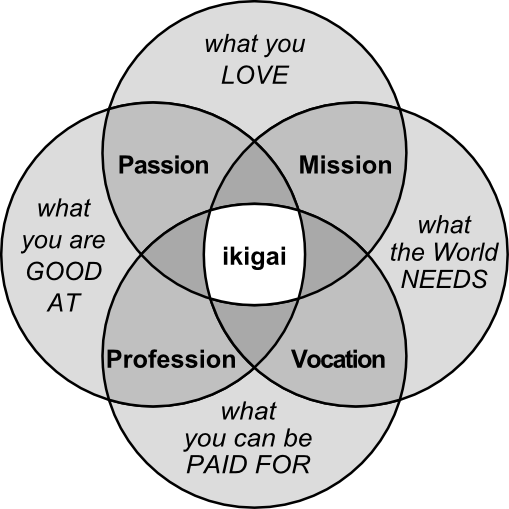Ikigai: Finding Your Personal Happiness
- By
- Steve Williamson, VP Digital Content at eRep
- Posted
- Monday, September 3, 2018

The Japanese have a concept called ikigai[1] that roughly translates into English as 'reason for being.' It can be graphically represented as a four-lobed Venn diagram with what you love, what you are good at, what you can be paid for, and what the world needs, all overlapping into passion, mission, profession, and vocation with a state of ikigai in the center.
Three of these lobes are practical and can be determined through formalized means, but discovering what you love can be elusive for many people.
The saying, "Do what you love and you'll never work a day in your life," only gets you so far as life advice. It assumes you already know what you love to do. Besides embarking on a potentially life-long process of trial and error, how do you define what will make you happy? How do you jump straight to that state of finding personal happiness?
Psychometric assessments like the Core Values Index and competing systems like Myers-Briggs and Strengths Finders have been used in the workplace for decades. They are often implemented during the hiring or promotion process as a way to determine fit for the role. In this case, it is one party — the employer — using the assessment to determine the path of an another — the candidate.
How does the individual take charge of their own life and use a psychometric assessment to find their own path?
One of the most powerful benefits of the Core Values Index is its ability to identify the areas of activity within a person's life where they will feel the most fulfillment and happiness. For example, in Core Values Index parlance, Innovators are happiest when they are solving problems; Bankers find their joy gathering and dispensing knowledge; Builders are at their peak when they are getting things done; and Merchants prefer to engage others and build meaningful relationships.
When you take the Core Values Index assessment, you receive a 17-page report customized specifically for you that details the type of activities and pursuits that will yield the greatest level of happiness and fulfillment. It also provides valuable information about the areas of life you will instinctively avoid because they provide the least happiness.
Taking the CVI gives you insight that helps you answer the ikigai question, "What do you love?" When you combine that knowledge and insight with your own answers to the other questions of what does the world need, what are you good at, and what can you be paid for, you will be well on your way toward achieving a state of ikigai and finding your reason for being.
Source: [1] https://en.wikipedia.org/wiki/Ikigai
Go to eRep.com/core-values-index/ to learn more about the CVI or to take the Core Values Index assessment.

Steve Williamson
Innovator/Banker - VP Digital Content at eRep
Steve Williamson writes about work, teams, and the practical challenges of building systems that have to function in the real world. His background spans three decades of project management, software development, and technical team leadership across a range of industries. Outside of eRep, Steve is the author of a series of fantasy novels and most recently a murder mystery set in Portland, Oregon, and enjoys cycling and old-school tabletop role-playing games.
View additional articles by this contributor
Essentials
Additional Reading
Stay Updated
Employer Account Sign-up
Sign up for an employer account and get these features and functions right away:
- Unlimited Job Listings on eRep.com
- Applicant Search
- Applicant Tracking System (ATS)
- Unlimited Happiness Index employee surveys
- 3 full/comprehensive CVIs™
- No credit card required — no long-term commitment — cancel at any time
